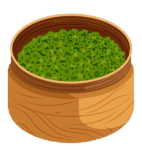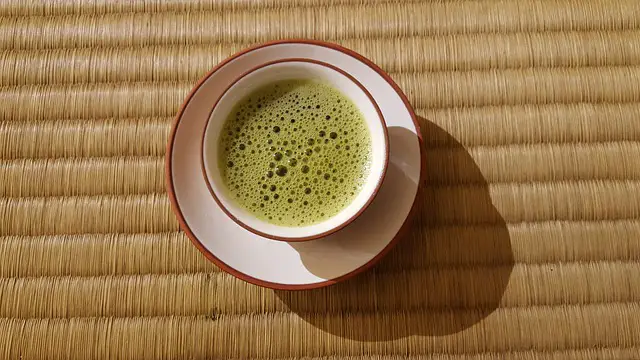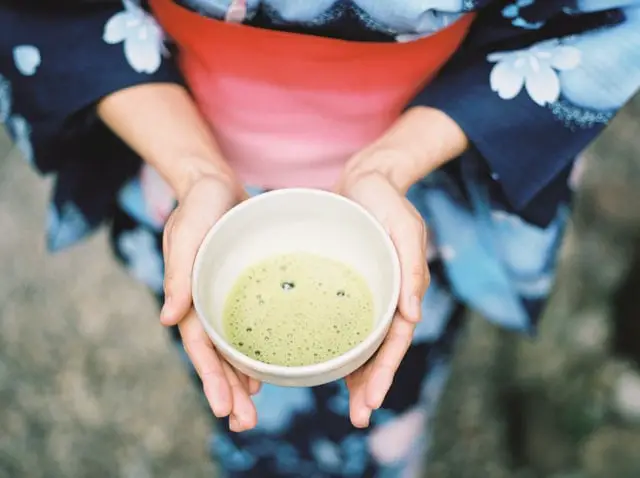
A single teaspoon of matcha can contain around 70mg of caffeine.
Many of my clients are enamored by the health benefits of matcha, but a lot of them are also looking to moderate their caffeine intake. This is why I am often asked does matcha contains caffeine.
In this post, I will guide you through the caffeine content of matcha and also show you some of its more unique properties. Here is what you need to know…
Contents
Yes, matcha does contain caffeine.
This is because it is made from the leaves of a true tea – green tea.
So, how much caffeine does this tea contain?
Well, you should be aware that the exact content can vary.
The resulting caffeine content can depend on the leaves are grown and processed.
Not to mention, you will only be consuming as much caffeine as the amount of matcha that you add to your drink.
On average, though, a single teaspoon of matcha contains up to 70mg of caffeine.
Thus, if you use a teaspoon of matcha per half cup of water – the recommended ratio – then this is how much caffeine you will be consuming.
Still, most people use far less matcha powder when making their tea.
Many will use around ½ or ¾ of a teaspoon per half a cup of water.
Due to this, the amount of caffeine that they take in reduces as well.

You’re probably wondering how matcha has so much caffeine in it – particularly since it is a type of green tea.
Well, the high caffeine content is largely related to the manner in which matcha is made and consumed.
See, with green tea – and most teas – you steep the leaves in hot water.
When the drink is ready, you discard the leaves and only drink the caffeine and nutrients that have leeched out.
With matcha, though, the drink is made with finely ground leaves.
Thus, when you drink it, you are ingesting the leaves as well.
As a result, you are automatically taking in more caffeine as well.
When you think of drinks with caffeine in them, you automatically think about an energy boost.
This is because caffeine is typically associated with keeping you alert and awake.
At the same time, you are probably aware that caffeine can come with its own set of side effects.
Most commonly, it can lead to jitters.
Matcha, on the other hand, is actually known to promote a sense of calmness, along with alertness.
This is due to the theanine that is found in matcha.
It helps to balance out the caffeine, providing you with stress relieving effects.
In this way, the impact of the caffeine in matcha is quite different to green tea, black tea, and coffee.
Even though matcha does help to promote a calm state, you still have to be aware of its caffeine content.
Thus, based on this, you need to know how much matcha is safe for you to consume.
Most experts would recommend you to drink no more than 2 to 3 cups of matcha a day.
Even then, be mindful of how much matcha you are adding to each cup.
For instance, if you are only using ½ a teaspoon of matcha, then you can afford to drink a bit more.
On the other hand, if you are adding a full teaspoon, you shouldn’t drink more than one or two cups.
Bear in mind that caffeine isn’t just associated with jitters and sleep disruption.
It can also cause stomach upsets if you ingest too much.
Pregnant women and children shouldn’t drink any matcha at all.

Of course, by itself, this number doesn’t mean much.
To really appreciate how much caffeine is in matcha, you have to be able to see how it compares to other popular drinks with caffeine.
Related Article
What are the Matcha Powder Grades?
To begin with, let’s see how matcha measures up against green tea.
As you may be aware, matcha is actually a type of green tea.
The only difference is that matcha is specifically shade-grown and that the whole leaves are used to make the drink.
So, how much caffeine is in green tea and is it as much as in matcha?
Once again, there can be quite a bit of variation with this tea.
Now, technically, a single cup of brewed green will contain around 30mg of caffeine.
However, there are some brands that may contain up to 50mg.
Regardless, there is no denying that matcha has more caffeine than green tea.
If you have ever thought about green tea vs. black tea, then you will know that black tea has more caffeine.
So, let’s take a look at the comparison of black tea against matcha.
A single cup of black tea may contain anywhere from 45mg to 90mg of caffeine.
In certain instances, matcha may be on par with black tea when it comes to caffeine content.
Nevertheless, you will often find that black tea has a higher content.
Not to mention, the way that the drinks are brewed, often means that the black tea ends up with more caffeine.
Needless to say, coffee has one of the highest caffeine contents among natural beverages.
Thus, it is interesting to see how matcha fares against this popular drink.
Well, on average, coffee can contain anywhere from 70 – 140mg per cup of java.
Traditionally, though, you can expect to find around 95mg per cup.
This means that coffee has a far higher content than matcha.
This concludes your foray into how much caffeine matcha has. As you can see, there is certainly a significant amount.
So, keep this in mind and adjust your matcha consumption accordingly.
If you enjoyed this post, make sure to head over to our Pinterest page. We have plenty of matcha-related posts for you.
